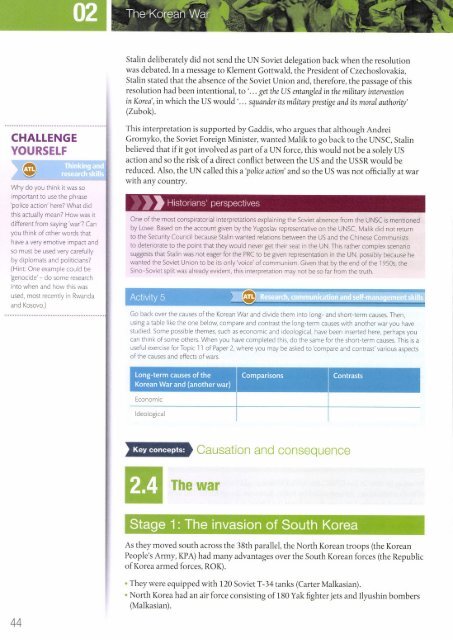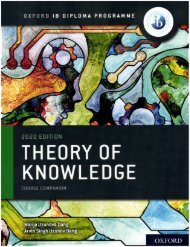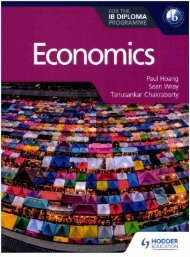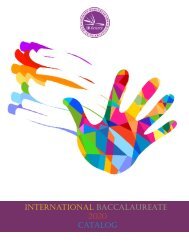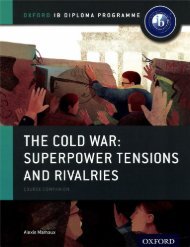SHELF 9780435183127 HISTORY PAPER 3 THE COLD WAR AND THE AMERICAS (1945-1981) STUDENT 60p
SHELF 9780435183127 HISTORY PAPER 3 THE COLD WAR AND THE AMERICAS (1945-1981) STUDENT 60p
SHELF 9780435183127 HISTORY PAPER 3 THE COLD WAR AND THE AMERICAS (1945-1981) STUDENT 60p
Create successful ePaper yourself
Turn your PDF publications into a flip-book with our unique Google optimized e-Paper software.
Stalin deliberately did not send the UN Soviet delegation back when the resolution<br />
was debated. In a message to Klement Gottwald, the President of Czechoslovakia,<br />
Stalin stated that the absence ofthe Soviet Union and, therefore, the passage ofthis<br />
resolution had been intentional, to ' . . . get the uS entangled in the military intervention<br />
in Korea' , in which the US would ' . . . squander its military prestige and its moral authoist'<br />
(Zubok).<br />
<br />
<br />
Why do you think it was so<br />
important to use the phrase<br />
'police action' here? What did<br />
this actually mean? How was it<br />
different from saying'war'? Can<br />
you think of other words that<br />
have a very emotive impact and<br />
so must be used very carefully<br />
by diplomats and politicians?<br />
(Hint: One example couid be<br />
genocide'- do some research<br />
into when and how this was<br />
used, most recently in Rwanda<br />
and Kosovo.)<br />
This interpretation is supported by Gaddis, who argues that although Andrei<br />
Gromyko, the Soviet Foreign Minister, wanted Malik to go back to the UNSC, Stalin<br />
believed that if it got involved as part of a UN force, this would nor be a solely US<br />
action and so the risk of a direct conflict berween the US and the USSR would be<br />
reduced. Also, the UN called this a'police action' andso the US was not officially at war<br />
with anycountry.<br />
One of the most conspiratorial interpretations explain ing the Soviet absence from the U NSC is mentioned<br />
by Lowe. Based on the account given by the Yugoslav representative on the UNSC, Mallk did not return<br />
to the Security Council because Stalin wanted relations between the US and the Chinese Communists<br />
to deteriorate to the point that they would never get their seat in the UN. This rather complex scenario<br />
suggests that Stalin was not eager for the PRC to be given representation in the UN, possibly because he<br />
wanted the Soviet Union to be its only'voice' of communism. Given that by the end of the I 950s, the<br />
Sino-Soviet split was already evident, this interpretation may not be so far from the truth.<br />
<br />
Go back over the causes ofthe Korean War and divide them into long- and short-term causes. Then,<br />
using a table ike the one below, compare and contrast the long-term causes with another war you have<br />
studied. Some possible themes, such as economic and ideological, have been inserted here, perhaps you<br />
can think of some others. When you have completed this, do the same for the short-term causes. This is a<br />
usefu I exercise for Topic 1 1 of Paper 2, where you may be asked to tom pare and contrast' various aspects<br />
ofthe causes and effects ofwars.<br />
Long-term causes of the<br />
Korean War and (another war)<br />
Economic<br />
ldeological<br />
Comparisons<br />
Contrasts<br />
Key concepts:<br />
Causation and consequence<br />
The war<br />
Stage 1: The invasion of South Korea<br />
As they moved south across the 38th parallel, the North Korean troops (the Korean<br />
People's A*y,KPA) had many advantages over the South Korean forces (the Republic<br />
of Korea armed forces, ROK).<br />
<br />
. They were equipped with 120 Soviet T-34 tanks (Carter Malkasian).<br />
. North Korea had an air force consisting of f AO Vak fighter jets and Ilyushin bombers<br />
(Malkasian).


